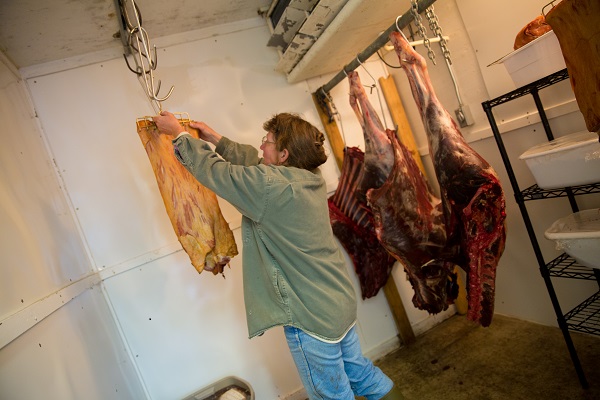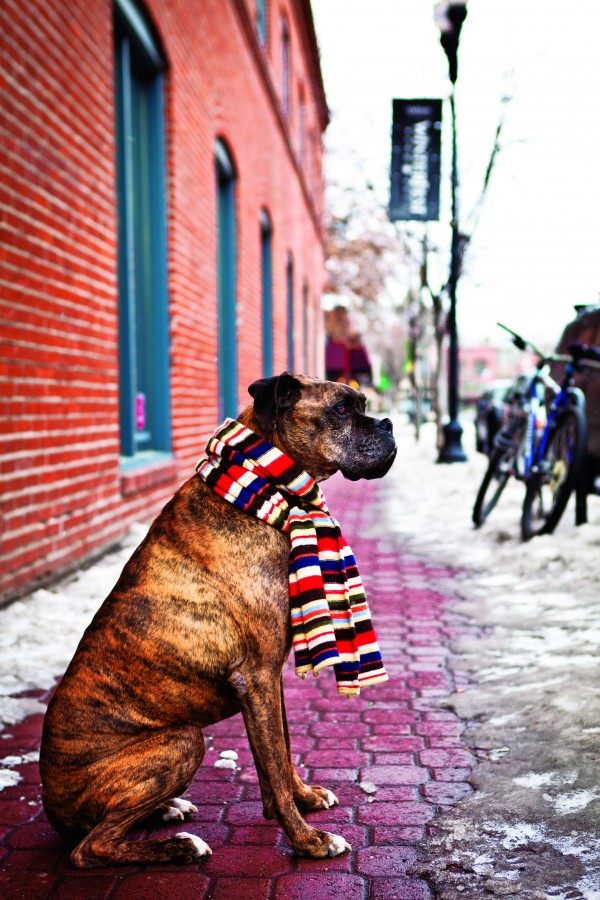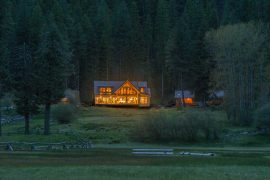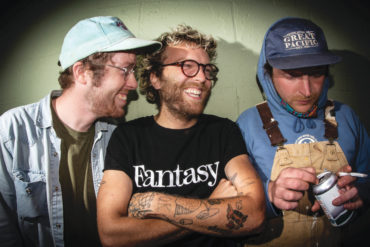written by Kevin Max
IN A WAY, IT MAKES PERFECT SENSE THAT ROSE FORSTER HOWE WOULD END UP BECOMING a medical technician, English riding instructor, butcher, fromager and soaper on a remote ranch in Eastern Oregon. True, the path there was a bit unexpected. But life doesn’t always travel in straight lines.
Video by Kevin Max
The night before I left to visit Rose and her husband, Darrell, in Monument, Oregon, I had memorized the route, not wanting to trot out my mobile phone in the quiet hills that rolled up to the north and middle forks of the John Day River. I’d be damned if I was going to resort to a GPS-enabled map to tell me how to get there. This scheme worked, too. Almost.
I knew Rose primarily from her Facebook posts, which is to say not at all. There were entries such as, “Dropped off a customer’s elk meat being shipped to California, picked up a ton and a half of grain.” And “New season cheese!!!! Lass is close to calving, so I will be drying her up in a week … but until then, I am back making cheese!” Finally “I am off to the butcher shop as soon as I finish this cup of tea to vac-pack 75lb of sausage, will then go milk my cow, then back to the butcher to cut 1 1/2 elk.”
Just reading these, I felt equal parts awe, exhaustion and curiosity. It was the latter, plus the love of bacon, that got me off my lazy ass to drive east. In this sparse region, a voice can travel far in any direction before falling to the ground, unheard. Cell phone signals don’t go as far.
Outside the town of Monument, Triple H Ranch sits nearly a half-mile down its gravel driveway. On the frontage of the 400-acre property is a hundred-year-old (more or less) one-room schoolhouse. No one out here cares to look too closely for fear that it would be deemed historic and therefore a regulatory hassle. For now, it serves as a hundred-ish-year-old tool shed.
A dozen wild turkeys as big as ostriches dart across the drive before perching on a fence and the back of an old pickup truck, watching the newcomer with their black Hitchcock eyes. The daredevil of the rafter races alongside the car before peeling off, in victory, I suppose.
Two milk cows inside a pen take a moment from their busy lives to look up. There are chickens off to the left, horses on the right, a couple of outbuildings ahead and a small cabin in the distance.
Inside one of these nondescript structures is a butchering surface, a meat slicer, a meat grinder, a transport cart, a wrapping- and-packaging station and a meat freezer big enough to accommodate an unbutchered cow. In the back is a walk-in cooler where pork shoulders rest, and sausage and hams hang.
It’s here that I encounter a short and trim woman of no particular age with burning bright blue eyes. She wears a man’s white button-down shirt with a Jackson Pollock ornamentation of animal blood on the front.
“Oh, hi,” she says, looking up from one of many mounds of thickly cut strips of bacon. On top of each is a piece of butcher paper with the surname of the eventual recipient. “I’m Rose,” she says. “You’ll excuse me if I keep working while we talk. It’s a busy time for us.” Her English accent hops from note to note alighting atop each syllable. I wouldn’t be surprised if she suddenly walked out of the butcher shop, opened an umbrella, bid me a pleasant “Good day” and helicoptered into the air while humming “Chim Chim Cher-ee.”
Instead, she tears and neatly stacks alternating pieces of plastic wrap and butcher paper. Then she grabs a handful of bacon she smoked over wood chips earlier that day, places it on a scale and quickly wraps it like a burrito before sealing it with paper tape. She repeats this process more than a dozen times. In ten minutes, she has two neat columns of six packages each. She produces a marker and writes customers’ names and “bacon” on each package. These are bound for clients in Alaska, South Dakota, New York City, Idaho, Seattle and residences throughout Oregon.
“We’re really fussy about our meat,” Rose offers as if divulging a deeply held secret.
Fussy indeed. Take Mrs. Howe’s approach to sausage, for example. Sausage, to most, would appear to be a fairly uncomplicated proposition, given a grinder, meat and sausage casings. The part you don’t want to know about how the sausage is made is the fat content. “I don’t like fat meat,” Rose says. “I only use a small portion of pig fat in my sausage. Less than most others and just enough to hold it together. I can’t see the point in selling my customers fat at $2.10 per pound.”
To that end, the Howes feed their animals apples, apricots and plums from neighbors’ orchards. “We’re kind of fussy about what our animals eat,” adds Rose.
Altogether, the ranch is home to more than a dozen pigs (most of which are weaners), five horses, two milk cows, twenty-four chickens, rabbits, a cat and a dog. Last year, the couple produced 1,800 pounds of pork, processed twenty-five elk and twenty-six deer (which includes making more than seventy-five pounds of jerky and 250 pounds of summer sausage and pepperoni). They made 375 pounds of their own smoked beef sausage, fifty-one wheels of cheese and more than 400 bars of soap. There was also cow’s milk, eggs, rabbits and turkeys, not to mention vegetables harvested from their garden.
“I believe in work first and play later,” says Rose, a point reinforced by her massive daily to-do lists and triumphant Facebook posts. “I’m really fortunate in that I really enjoy what I do.” In my head, Julie Andrews dances through a messy child’s room singing, “A spoonful of sugar helps the medicine go down … in the most delight- ful way.”
At noon, and after six hours of butchering, slicing and packaging bacon, Rose is finally ready for a break. “Would you like to join me for a cup of tea at the house?”
With a cup of tea at the Howe ranch comes stories of recent adventures with animals.
One such story began one evening, when Rose and Darrell heard coyotes causing a ruckus behind their house. Darrell was laid up, recovering from surgery. For her part, Rose was marginally more mobile, hobbled with torn ligaments in her foot from a fence-climbing accident. She put on her coat, grabbed her rifle and limped out back.
She looked across the field and saw nothing. There were no sounds coming from the woods to the west. She limped to the solitary tree in the middle of the field. At that moment, three coyotes shot from the woods, across the field past her, then doubled back and forked the tree she was standing behind. The coyotes were so keen on watching the edge of the woods that they didn’t notice Rose standing ten feet from them with her rifle. Rose, too, sensed a pecking order and turned her attention from the coyotes to the woods.
The cougar loped forward and into view. At three to one, the coyotes didn’t like their chances and bolted. The cougar continued its cautious progress across the field and toward the tree. Now, Rose was pinned. Back at the house, Darrell knew that Rose was gone longer than it usually takes to chase away garden variety coyotes. There was something else out there. He sat and listened.
The lethal cat came closer and closer, the coyotes long gone. Rose was a decent shot, having been out hunting with Darrell. This was different. It was life or death. She raised the shotgun, aimed as Darrell had taught her and fired.
Up at the house, Darrell heard the shots and knew that Rose had done something big.
While Rose can’t help herself from constantly working, Darrell, retired from thirty years as an electrician, keeps their farm machinery in working order. They met in Central Oregon in 1987.
Darrell built by hand the meat smokehouses, the shop, the barn, the house and developed the spring on the property. At 76, he’s scaled back a bit, operating tractors to tip bins of apples into the pigpens, and to load and distribute hay for the horses.
In a garage next to the butcher shop, Darrell tinkers on restoring classic American cars, turning decrepit hulls into gleaming collectibles.
“He’s my rock,” Rose offers. “He encourages me to try new things and not be afraid to fail.”
That kind of support was missing from Rose’s childhood.
Though it must seem all a bad dream to her now, Rose Forster spent her childhood on the lam. “We never had much more than would fit into a suitcase,” she recalls.
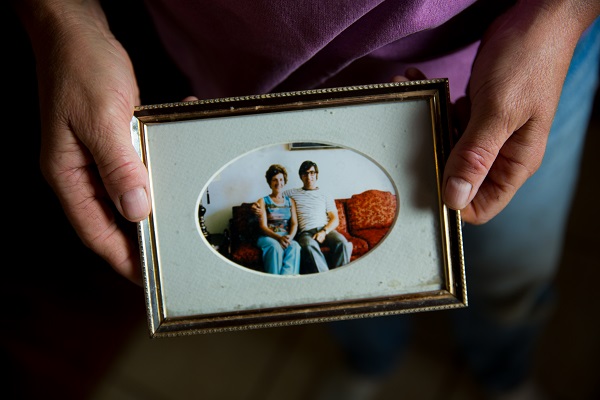
Her mother and father met in England, married and had Rose in 1960. When Rose was still very young, the family, which included three sons from her mother’s previous marriage, moved to Hamilton, Ontario, her mother’s hometown. Soon after, though, her father asked Rose to go for a walk. That stroll ended at the airport and aboard a plane back to England.
This abduction began the circus of being dragged from one English town to the next as lawyers began zeroing in on their location. A “Catch Me If You Can” life ensued. She recalls her father paid cash for his cars and a string of businesses in small towns across East Anglia. They bought their clothes in cash from the Salvation Army.
“My father was the perfect English gentleman, and extremely charismatic,” Rose says. His charm could easily separate women and their money. Officially, her father was a tool and die maker. That appears to have been only a part of his income—probably the smaller part. “It’s hard to say what he did for a living,” Rose concedes.
This insecure upbringing shaped Rose. She finished grammar school—the equivalent of American high school—ahead of schedule when she was 16 years old. With her father, she traveled back and forth from England to various points in Canada, though hoping one day to stay put long enough to attend school to become a veterinarian.
“I was extremely dependent on my dad,” she recalls. “That aspiration of being a veterinarian quickly went out the window as we moved from place to place.”
Her father, Thomas Forster, eventually died of cancer in Victoria, British Columbia in 2000. But even his death seemed like another controlling plot to Rose. In the end, he was never caught nor charged with any crime, but the ghost of his influence haunts her to this day. “When he died, I was afraid to go into the room where his ashes were,” Rose confides. “I feared that he still held some power over me.”
Few people today who have seen Rose in perpetual motion would question her independence. She trained herself to become an emergency medical technician, to butcher hogs and elk, and to make soap and cheese. Perhaps it’s the fear of dependence that drives her to work long days in the butcher shop, to work as an EMT and to defend her animals from predators at night.
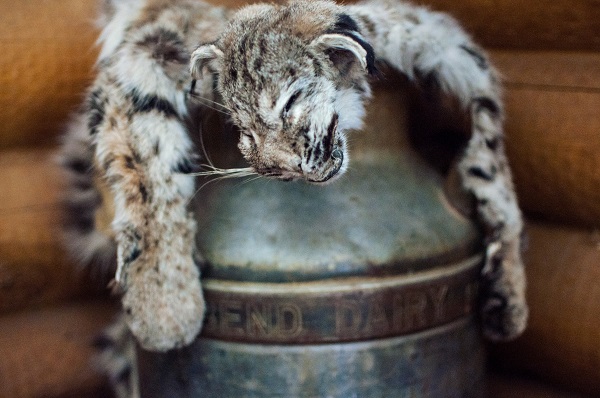
The final day of my visit, I lit out on foot to reach the top of a hill adjacent to Triple H Ranch to take it all in. Darrell called to alert the neighbors, whose property I would have to cross, and offered me a loaded pistol for protection. I recalled the story of Rose and the cougar she had shot and gingerly slipped the pistol into my least lethal pocket.
Heading out with the pistol, though, I decided that I was a bigger threat to myself and others than to a cougar and left it on the table in my bunkhouse quarters.
As I hiked up the neighboring ridge, I took in the fog, the light rain, the greens and browns of land and the tiny town of Kimberly far below. From the other side of the crest, I could see Rose and Darrell’s house, the butcher shop where Rose was working away, the garage where Darrell wrenched on his project, the hay barn and the horse pasture. At my feet, were fresh cougar tracks.


